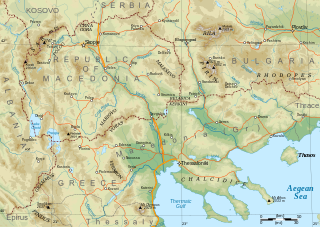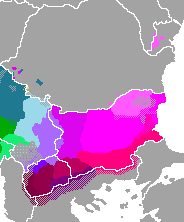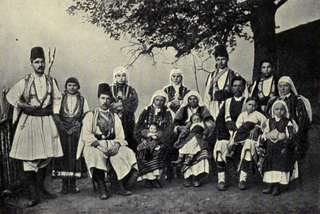
Macedonia is a geographical and historical region of the Balkan Peninsula in Southeast Europe. Its boundaries have changed considerably over time; however, it came to be defined as the modern geographical region by the mid 19th century. Today the region is considered to include parts of six Balkan countries: larger parts in Greece, North Macedonia, and Bulgaria, and smaller parts in Albania, Serbia, and Kosovo. It covers approximately 67,000 square kilometres (25,869 sq mi) and has a population of 4.76 million.
The history of North Macedonia encompasses the history of the territory of the modern state of North Macedonia.

Slavs are the largest European ethnolinguistic group. They speak the various Slavic languages, belonging to the larger Balto-Slavic branch of the Indo-European languages. Slavs are geographically distributed throughout northern Eurasia, mainly inhabiting Central and Eastern Europe, and the Balkans ; and Siberia to the east. A large Slavic minority is also scattered across the Baltic states and Central Asia, while a substantial Slavic diaspora is found throughout the Americas, as a result of immigration.
Macedonian most often refers to someone or something from or related to Macedonia.

Macedonians are a nation and a South Slavic ethnic group native to the region of Macedonia in Southeast Europe. They speak Macedonian, a South Slavic language. The large majority of Macedonians identify as Eastern Orthodox Christians, who speak a South Slavic language, and share a cultural and historical "Orthodox Byzantine–Slavic heritage" with their neighbours. About two-thirds of all ethnic Macedonians live in North Macedonia and there are also communities in a number of other countries.
Muslims is a designation for the ethnoreligious group of Serbo-Croatian speaking Muslims, inhabiting mostly the territory of the former Yugoslav republics. The term, adopted in 1971, designates Serbo-Croatian speaking Muslims, thus grouping together a number of distinct South Slavic communities of Islamic ethnocultural tradition. Prior to 1993, a vast majority of present-day Bosniaks self-identified as ethnic Muslims, along with some smaller groups of different ethnicity, such as Gorani and Torbeši. This designation did not include Yugoslav non-Slavic Muslims, such as Albanians, Turks and Roma.

The region of Macedonia is known to have been inhabited since Paleolithic times.

Torlakian, or Torlak is a group of South Slavic dialects of southeastern Serbia, Kosovo, northeastern North Macedonia, and northwestern Bulgaria. Torlakian, together with Bulgarian and Macedonian, falls into the Balkan Slavic linguistic area, which is part of the broader Balkan sprachbund. According to UNESCO's list of endangered languages, Torlakian is vulnerable.

The existence and distinctiveness of the Macedonian language is disputed in Bulgaria and the name of the language was disputed by Greece. By signing the Prespa Agreement, Greece accepted the name "Macedonian language" in reference to the official language of North Macedonia.

The name Macedonia is used in a number of competing or overlapping meanings to describe geographical, political and historical areas, languages and peoples in a part of south-eastern Europe. It has been a major source of political controversy since the early 20th century. The situation is complicated because different ethnic groups use different terminology for the same entity, or the same terminology for different entities, with different political connotations.

The Serbs are one of the constitutional ethnic groups of North Macedonia, numbering about 24,000 inhabitants.

Macedonian nationalism is a general grouping of nationalist ideas and concepts among ethnic Macedonians that were first formed in the late 19th century among separatists seeking the autonomy of the region of Macedonia from the Ottoman Empire. The idea evolved during the early 20th century alongside the first expressions of ethnic nationalism among the Slavs of Macedonia. The separate Macedonian nation gained recognition after World War II when the "Socialist Republic of Macedonia" was created as part of Yugoslavia. Afterwards the Macedonian historiography has established historical links between the ethnic Macedonians and events and Bulgarian figures from the Middle Ages up to the 20th century. Following the independence of the Republic of Macedonia in the late 20th century, issues of Macedonian national identity have become contested by the country's neighbours, as some adherents to aggressive Macedonian nationalism, called Macedonism, hold more extreme beliefs such as an unbroken continuity between ancient Macedonians, and modern ethnic Macedonians, and views connected to the irredentist concept of a United Macedonia, which involves territorial claims on a large portion of Greece, along with smaller regions of Albania, Bulgaria, Kosovo and Serbia.

The Macedonians in Albania are an officially recognized ethnic minority. According to the 2011 census, 5,512 ethnic Macedonians live in Albania. In the 1989 census, 4,697 people had declared themselves Macedonian. In some circumstances, ethnic identity can be fluid among Albania's Slavophonic population, who may identify as Macedonian or Bulgarian, depending on the circumstances. Albanian Slavs are targeted by "Bulgarian cross-border nationalism" and, as an EU member, Bulgaria offers more benefits to this minority than Macedonia does. According to Edmond Temelko, former mayor of the Pustec Municipality, "[...] Bulgaria uses heavy economic situation of Macedonians in Albania to offer them Bulgarian citizenship, passports and employment opportunity".

Ethnic Bulgarians in present-day Albania live mostly in the areas of Mala Prespa, Gollobordë and Gora. According to the Bulgarian State Agency for Bulgarians Abroad, 40,000 to 50,000 persons of Bulgarian origin are living in Albania. Ethnic identity can be fluid among the Albania's Slavophonic population, who might identify as Albanian, Bulgarian or Macedonian, depending on the circumstances. Between 2001 and 2016, around 4,470 Albanian nationals applied for a Bulgarian citizenship and over 2,600 of them were granted one. The Bulgarian minority was recognized by the Albanian government in October 2017.
Slavic speakers are a minority population in the northern Greek region of Macedonia, who are mostly concentrated in certain parts of the peripheries of West and Central Macedonia, adjacent to the territory of the state of North Macedonia. The language called "Slavic" in the context of Greece is generally called "Macedonian" or "Macedonian Slavic" otherwise. Some members have formed their own emigrant communities in neighbouring countries, as well as further abroad.

Macedonians or Macedonian Bulgarians, sometimes also referred to as Macedono-Bulgarians, Macedo-Bulgarians, or Bulgaro-Macedonians are a regional, ethnographic group of ethnic Bulgarians, inhabiting or originating from the region of Macedonia. Today, the larger part of this population is concentrated in Blagoevgrad Province but much is spread across the whole of Bulgaria and the diaspora.

North Macedonia, officially the Republic of North Macedonia, is a country in Southeast Europe. It gained independence in 1991 as one of the successor states of Yugoslavia. It is a landlocked country bordering Kosovo to the northwest, Serbia to the north, Bulgaria to the east, Greece to the south, and Albania to the west. It constitutes approximately the northern third of the larger geographical region of Macedonia. Skopje, the capital and largest city, is home to a quarter of the country's 1.83 million people. The majority of the residents are ethnic Macedonians, a South Slavic people. Albanians form a significant minority at around 25%, followed by Turks, Romani, Serbs, Bosniaks, Aromanians and a few other minorities.

Gollobordë refers to a geographical area of traditionally 24 villages of which 18 are situated primarily in eastern Albania, with a small portion consisting of six villages lying within North Macedonia. This region is located within the Dibër and Elbasan counties which contain both Macedonian and Albanian villages.

The Eastern South Slavic dialects form the eastern subgroup of the South Slavic languages. They are spoken mostly in Bulgaria and North Macedonia, and adjacent areas in the neighbouring countries. They form the so-called Balkan Slavic linguistic area, which encompasses the southeastern part of the dialect continuum of South Slavic.

Slavic-speakers inhabiting the Ottoman-ruled region of Macedonia had settled in the area since the Slavic migrations during the Middle Ages and formed a distinct ethnolinguistic group. While Greek was spoken in the urban centers and in a coastal zone in the south of the region, Slav-speakers were abundant in its rural hinterland and were predominantly occupied in agriculture. Habitually known and identifying as "Bulgarian" on account of their language, they also considered themselves as "Rum", members of the community of Orthodox Christians.













